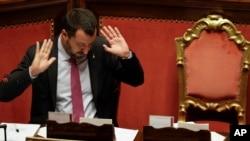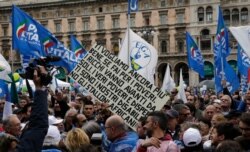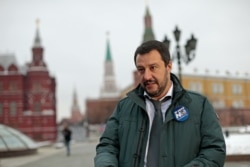Italy’s deputy prime minister, Matteo Salvini, is shrugging off allegations that his populist party sought secret Russian funding and is doubling down on his defense of “Christian culture” and the issue that has rewarded him the most in the voting booths — immigration.
While prosecutors in Milan probe claims that the far-right Lega party solicited covert Russian funding, the Italian deputy prime minister has been stepping up the tempo and fervor of his anti-migrant broadsides in rallies and on his social media sites, linking migration to crime and to joblessness and warning of threats to Italy’s traditional culture.
Salvini critics say he’s purposely trying to distract attention away from the Russia allegations and away from the country’s ailing economy, which is stubbornly mired in recession.
The persistent allegations of secret Russian funding took on new impetus last week when the online news site Buzzfeed posted audio tapes of a meeting in a Moscow hotel between Salvini’s former press spokesman, Gianluca Savoini, and unidentified Russians discussing the possibility of diverting $65 million to the Lega by means of discounted Russian oil transactions.
Milanese prosecutors have sought to question Savoini, who attended a July 4 state dinner in Rome for Russian President Vladimir Putin at Salvini’s request, but the former journalist has exercised his right to not to respond to questions, according to the Italian news agency Ansa.
Salvini is taking a similar tack with the media. He poured scorn on the allegations in a statement last week, saying he’s never taken “a ruble, a euro, a dollar or a liter of vodka.” And he says his admiration for Russian President Vladimir Putin comes “free” — so, too, his opposition to European sanctions imposed on Russia for the 2014 annexation of Crimea from Ukraine.
But on Monday he told reporters, “I don’t intend to speak anymore about money that I never saw and that I never asked for.”
And so far he has resisted a mounting clamor to appear before the country’s parliament to answer questions about the alleged meeting involving Savoini, the president of an Italian-Russian business association and one of the Lega’s main contacts with the Kremlin.
Instead Salvini has upped his anti-migrant rhetoric in the face of opposition criticism that he is stoking racial hatred. And it appears to be paying off in the opinion polls. His Lega party has enjoyed a relentless rise in support at the cost of its partner in Italy’s uneasy coalition government, the anti-establishment Five Star Movement.
On Tuesday he sent a letter to Italy's prefects calling on them to prepare “a report on the presence of Roma, Sinti and Camminanti settlements” within their territories in order to “prepare a plan of clearances” of illegal camps.
Salvini has held a series of Trump-style rallies in what was until recently traditional leftwing territory in central Italy known as the country’s “red belt.” Near Bologna Saturday Salvini boasted there’ll be far fewer foreign vendors plying their trade on Italy’s beaches this year because of police raids — and he saluted the local soccer team for not signing up foreign players.
To cheers from the crowd of adoring enthusiasts, who waved blue-and-white flags emblazoned with the words “Prima L’Italia, Salvini ridiculed the German captain of a migrant rescue ship, mocking her for her dreadlocks. The captain, Carola Rackete, who defied Salvini by disembarking 40 migrants in Sicily, has already said she plans to sue Italy’s deputy prime minister for his tirade of insults aimed at her.
A week earlier in the Umbrian hilltop town of Orvieto the Salvini, wearing his trademark man-of-the-people chinos and open-neck shirt, linked foreigners to crime and the charities that help them to foreign actors determined to swamp traditional Christian culture.
On his Facebook page, Salvini has accused the EU-supported charities of trying to wreck European civilization. “These are not rescue operations. They are planned operations to invade Europe sponsored by billionaires — not philanthropists — by billionaire speculators like Soros who want to cancel people’s roots, culture and tradition and want new slaves,” he says.
Hungary populist nationalist leader Viktor Orban has also focused his ire on the Hungarian-born American philanthropist George Soros, drawing charges of anti-Semitism.
Despite criticism from the Vatican and Italy’s liberal parties, the rhetoric is driving Salvini’s polling numbers up, prompting mounting speculation that he’ll seek soon to engineer a collapse of the coalition government and trigger a snap election, hoping to be able to ditch the Five Star Movement altogether and govern alone or with the support of the far-right Brothers of Italy. Lega national support is now at 38 percent, just two per cent short of threshold that would, if repeated in an actual election, give the party a majority in the parliament.
Italy’s prosecutors, though, remain a risk for Salvini, say analysts, and could trip him up with help from the Lega’s coalition partner.
Five Star lawmakers are now also starting to demand answers to the persistent allegations that Salvini sought secret Russian funding for his party. Fellow-Deputy prime minister and political rival Luigi Di Maio of the Five Star Movement has called for a parliamentary commission to investigate the funding of the country’s political parties.
Asked by reporters Monday whether Salvini should appear before parliament, Italy's Prime Minister Giuseppe Conte, who was picked for his post by the Five Star Movement, responded, “why not?”
He added: “We believe in transparency in every seat of office, parliament first of all. Our guidelines are clear: absolute transparency for Italian citizens and absolutely loyalty to national interests. And on this, the government will not budge an inch.”
A day earlier Conte pointed out, unhelpfully for the Lega, that Savoini was added to the guest list for the July 4 dinner for President Putin at the request of Salvini’s office. Salvini earlier said he didn’t know why Savoini had attended.






